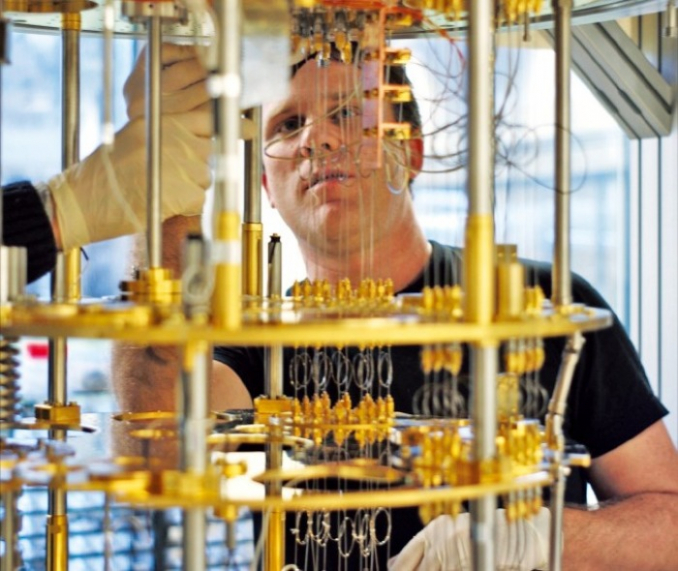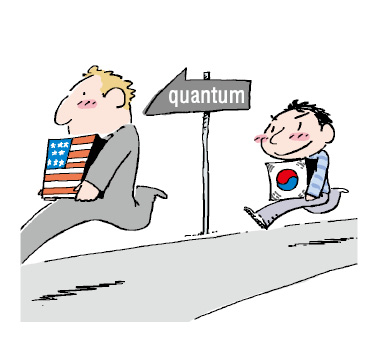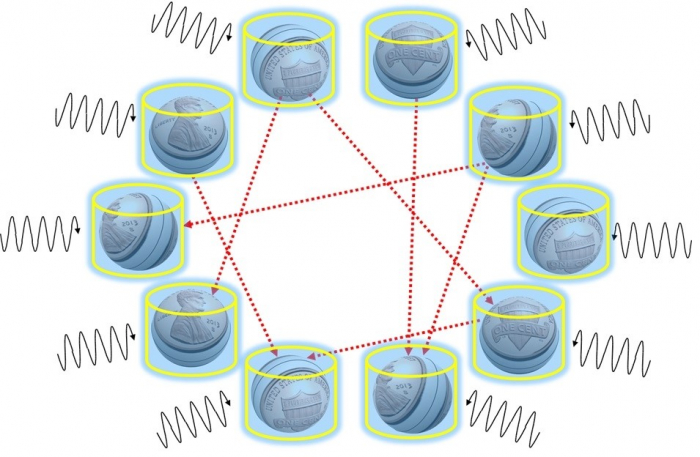Tech, Media & Telecom
Experts criticize Seoul's quantum computer development efforts
The Korean government invests a fraction of the amount its US and Chinese counterparts spend on quantum computing
By Aug 12, 2022 (Gmt+09:00)
3
Min read
Most Read
LG Chem to sell water filter business to Glenwood PE for $692 million


KT&G eyes overseas M&A after rejecting activist fund's offer


Kyobo Life poised to buy Japan’s SBI Group-owned savings bank


StockX in merger talks with Naver’s online reseller Kream


Meritz backs half of ex-manager’s $210 mn hedge fund



The United States: 4158. South Korea: 50
These figures refer to the number of qubits in a quantum computer that each country seeks to develop by 2026.
A qubit, or a quantum bit, is a unit of information in quantum computing. The number of qubits indicates a quantum computer's power.
Because each added qubit doubles the processor's computing capabilities, the difference between 50 qubits and 4158 qubits is astronomical.

On Thursday, the Ministry of Science and ICT (MSIT) held a conference for academics and quantum computing industry players.
Vice Minister for Science, Technology and Innovation Joo Young-Chang said: “Korea lacks an industrial ecosystem in the quantum computing sector, which widens its technological gap with the other advanced economies.”
A quantum computer is the most advanced type of computer to date, which harnesses quantum states of subatomic particles to store information.
Through quantum mechanics, calculations that would take 10,000 years on a supercomputer can be processed in less than 10 seconds.
Experts say the technology will make the existing cryptography obsolete and be used in a multitude of sectors including developing new drugs in pharmaceuticals.

The Korean government introduced its investment strategy for quantum technology research and development only in April last year, allocating 49 billion won ($37.6 million) toward its R&D budget.
The private sector appears to be further along the pipeline.
Automotive giant Hyundai Motor Co. is working with U.S.-based quantum computer firm IonQ to apply quantum machine learning to image classification and 3D object detection for future mobility.
OFFSHORE EXAMPLES
In December 2018, then-US President Donald Trump signed the National Quantum Initiative Act, which calls for a “coordinated Federal program to accelerate quantum research and development for economic and national security” and allocated $1.2 billion to develop quantum technologies over the next five years.
In 2020, the U.S. government established 12 new research centers to boost artificial intelligence and quantum computing.
This May, US technology behemoth IBM announced it will debut IBM Quantum Kookaburra, a 4,158-qubit system, by December 2025.
The quantum computer is expected to embrace classical parallelization, long-range couplers and chip-to-chip couplers.
IBM commercialized a 65-qubit computer in 2020 and a 127-qubit system last year. It plans to ratchet up the power to as high as 433 qubits later this year.
Meanwhile in Asia, China succeeded in creating a 66-qubit quantum processor dubbed Zhuchongzhi 2 in October 2021.
Tokyo injected more than 2 trillion won ($1.5 billion) into telecom giant NTT and Tokyo University for building next-generation quantum computing technologies.
Echoing his peers' sentiments, Professor Park Je-geun at Seoul National University’s Physics and Astronomy department said, "Korea’s quantum computer research is too far behind that of other nations.”
He added that the country should urgently put together a detailed quantum computing blueprint of what it needs to achieve and by when.
Write to Jin-Won Kim at jin1@hankyung.com
Jee Abbey Lee edited this article.
More to Read
-
 Korean gamesKrafton founder: Robotics, deep learning should be S.Korea’s future
Korean gamesKrafton founder: Robotics, deep learning should be S.Korea’s futureJul 05, 2022 (Gmt+09:00)
4 Min read -
 Business & PoliticsSeoul, Washington to bolster small nuclear reactor tech alliance
Business & PoliticsSeoul, Washington to bolster small nuclear reactor tech allianceMay 19, 2022 (Gmt+09:00)
6 Min read -
 Future mobilityHyundai Motor expands partnership with quantum computing firm IonQ
Future mobilityHyundai Motor expands partnership with quantum computing firm IonQApr 20, 2022 (Gmt+09:00)
3 Min read
Comment 0
LOG IN


